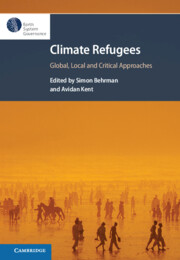Book contents
- Climate Refugees
- Series page
- Climate Refugees
- Copyright page
- Contents
- Contributors
- Acknowledgements
- 1 An Alternative Introduction: An Interview with the Editors, Which Never Took Place
- Part I Global Governance
- Part II International Law
- Part III Regional and Local Perspectives and Solutions
- 9 Climate Migration and Its Inclusion in Mexican Legal and Political Frameworks
- 10 Integrating Climate-Induced Mobility in Climate and Migration Policies in Brazil
- 11 Climate Displacement and Community-Led Solutions
- 12 ‘Climate-Displaced People’: A Small Island Developing States Perspective
- 13 Any Port in a Storm? Climate, Mobility, and Choice in Pacific Small Island Developing States
- 14 The Role of Environmental Disasters in Asylum Cases: Do German Courts Take Disasters into Account?
- 15 Building Governance Resiliency: Lessons from the United States
- Part IV Critical Approaches
- Index
12 - ‘Climate-Displaced People’: A Small Island Developing States Perspective
from Part III - Regional and Local Perspectives and Solutions
Published online by Cambridge University Press: 01 April 2022
- Climate Refugees
- Series page
- Climate Refugees
- Copyright page
- Contents
- Contributors
- Acknowledgements
- 1 An Alternative Introduction: An Interview with the Editors, Which Never Took Place
- Part I Global Governance
- Part II International Law
- Part III Regional and Local Perspectives and Solutions
- 9 Climate Migration and Its Inclusion in Mexican Legal and Political Frameworks
- 10 Integrating Climate-Induced Mobility in Climate and Migration Policies in Brazil
- 11 Climate Displacement and Community-Led Solutions
- 12 ‘Climate-Displaced People’: A Small Island Developing States Perspective
- 13 Any Port in a Storm? Climate, Mobility, and Choice in Pacific Small Island Developing States
- 14 The Role of Environmental Disasters in Asylum Cases: Do German Courts Take Disasters into Account?
- 15 Building Governance Resiliency: Lessons from the United States
- Part IV Critical Approaches
- Index
Summary
With sea levels rising and small island developing states feeling the impacts of climate change, migration due to inhospitable conditions or the submergence of island nations is becoming more of a pressing issue. There is a clear gap in the legal protection, or lack thereof, that will be afforded to climate-displaced persons. This chapter delves into the third of a triple injustice against island nations and their people by focusing on an expected third wave of forced migration caused by climate change. The chapter (1) explores the issues that island nations will face because of either becoming uninhabitable or submerged, with a particular focus on matters arising under the Law of the Sea Convention; (2) examines the current efforts and missed opportunities within the UNFCCC process and outside, including both national and international efforts; and (3) finally, makes recommendations on how this gap for legal protection can be addressed. Throughout this chapter, it reveals the unfairness of some burdens placed on SIDS to addressed climate-induced displacement and the fact that the lethargy in addressing the protection gaps presents a frightening uncertain future for island nations and its people.
- Type
- Chapter
- Information
- Climate RefugeesGlobal, Local and Critical Approaches, pp. 231 - 248Publisher: Cambridge University PressPrint publication year: 2022



